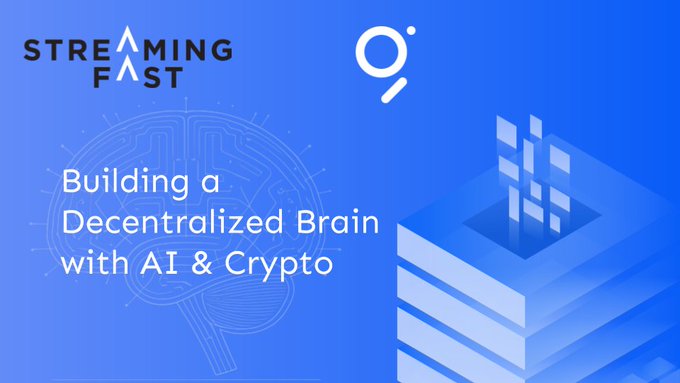Streaming Fast, a company exploring the future of decentralized technology, has published an article discussing the potential of combining The Graph, a web3 protocol for organizing and accessing blockchain data, with artificial intelligence and Geobrowser, a platform for visualizing and analyzing geospatial data. The article highlights the unlimited potential of decentralized knowledge graphs powered by The Graph and AI, promising a revolution in data accessibility and trust.
What happens when you combine The Graph, AI, & @geobrowser 🧐 A revolution in data accessibility & trust! @streamingfastio dives into the future & explains the unlimited potential of decentralized knowledge graphs & AI powered by The Graph. Read the post 🔽
Today we are excited to share @streamingfastio’s vision of how @graphprotocol will play a meaningful role at the intersection of AI and crypto. streamingfastio.medium.com/building-a-dec… While there has been a lot of hype and fanfare for the many ways that these 2 technologies can become
The Graph Connects with Builders at Solana Breakpoint Abu Dhabi

**The Graph is live at Solana Breakpoint Abu Dhabi** (Dec 11-13), actively connecting with builders and development teams. The protocol is focusing on three key areas: - **Data reliability** solutions - **Data access** infrastructure - **AI agents** integration The Graph team is available for project discussions and collaboration opportunities with Solana ecosystem builders. This follows their earlier announcement about bringing enhanced data indexing and infrastructure capabilities to the Solana network.
The Graph's Hidden Network: How Human Operators Power Web3's Data Layer
**The Graph reveals its true nature** - not just software, but a **human-powered network** of operators working together daily. - Indexers coordinate through Discord, forums, and on-chain interactions - These operators keep apps running and AI agents fed with reliable data - **Infrastructure work isn't glamorous**, but it's what enables web3 to scale Nick's early experience at The Graph gave him front-row access to understanding indexing. The key insight most people miss: **The Graph succeeds because of its community**, not just its technology. While infrastructure may lack romance, it provides the **predictable data layer** that web3 desperately needs to grow beyond experimental use cases.
🔄 Graph Migration Guide
The Graph has released a **migration guide** for developers looking to transition from Alchemy's centralized APIs to The Graph's decentralized subgraph solution. The guide provides step-by-step instructions for: - Moving from hosted services to subgraphs - Accessing blockchain data through The Graph's protocol - Leveraging new subgraph features This migration path offers developers an alternative to centralized data providers, enabling direct access to organized blockchain data through The Graph's decentralized network. [View the migration guide](https://thegraph.com/docs/en/resources/migration-guides/migrate-from-alchemy/)
🤖 x402 Protocol Revives 30-Year-Old HTTP Payment Code
**x402 protocol** is bringing the forgotten HTTP 402 "Payment Required" status code back to life after 30 years of dormancy. **Key Features:** - Machine-native billing standard for AI agents - Enables per-request payments without accounts or API keys - Supports payments for data access, compute, and API queries - Backed by Coinbase and Cloudflare **How it works:** 1. Agent requests paid resource 2. Server responds with HTTP 402 + payment details 3. USDC payment processed through facilitator 4. Access granted instantly upon verification **The Graph Integration:** The Graph's data infrastructure provides the verifiable, queryable blockchain data that x402 transactions require. Their GraphTally already implements similar microtransactions at the protocol layer. **Combined Impact:** - x402 = open payment rail for agents - The Graph = open data rail for decisions - Together = autonomous systems that think, pay, and verify This creates a **machine-driven economy** where AI agents can autonomously transact using stablecoins across multiple chains including Base, Solana, and Polygon.
🏗️ Graph sponsors demo day
**The Graph Foundation** sponsored SmartCon's inaugural VC Demo Day, connecting emerging web3 projects with venture capital investors. The event showcased: - Real blockchain projects seeking funding - Technical talent from the web3 builder community - Investment opportunities in decentralized infrastructure **Derek Meyer** from The Graph's Technical Council served as a judge, evaluating projects alongside other industry experts. The sponsorship aligns with The Graph's mission to **support the next generation** of web3 developers and infrastructure builders.
